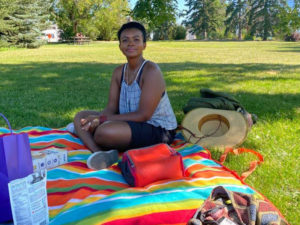Looking at the Arts Professionals Survey
Capturing numbers and stories, revamped survey explores the bigger picture
In September 2020, Calgary Arts Development undertook a survey of arts professionals to better understand their status in Calgary. The online survey was an expanded update to the 2017 Calgary Arts Professionals Survey, building upon past survey questions and findings as well as asking new questions relevant to the COVID-19 pandemic and to equity, diversity, inclusion, and accessibility.
Why did we ask open-ended questions and conduct focus groups in this version of the Arts Professionals Survey?
Sylvia Cheuy from the Tamarack Institute says, “There is never data without story, and there is no story without data.”
Capturing the numbers is so important. It sorts out how much you have and how much is missing.
From the 2020 Arts Professionals Survey we found out how many respondents actually received Canada Emergency Response Benefit (CERB). However, through our open-ended questions we found out that missing income, due to the pandemic, has affected people’s ability to care for their loved ones—especially if they were the sole-caregiver for children, partners, and parents. Some respondents had to move in with their partners and their partners had to cover their expenses. Now that it is 2022, we can only imagine the continued effect the pandemic has had on these relationships and the responsibilities attached.
The CERB questions also surfaced the interconnectedness of respondents’ various jobs. Respondents who worked in the service sector, as a secondary source of employment, also saw their wages further cut or lost due to the lock-downs. For arts educators, the closure of schools and limitations on in-person learning had a big impact, as they could not go into schools to do programming for students. These professionals had a significant amount of income lost. Many who solely worked in the arts had to consider leaving the sector for other work; but there were worries over how to write a non-arts CV, or over the compatibility of their skill sets.
These are only some of the insights we found from the CERB comments, which lead to the necessity of having focus groups. The purpose of the focus groups was to hone in on some specific questions we had based on survey comments and anecdotes received by staff. From the focus groups we found that these contributors considered their finances as a way of reinvesting in their practice. They negotiated ways to make their finances stretch between gigs rather than really think in terms of savings and debt (there often was not enough money to consider savings). What was also highlighted was the struggle between the reality of being an entrepreneur, yet, not learning about entrepreneurship in school. Participants found that they had to figure it out by themselves, and they had a hard time finding arts specific information—particularly on taxation in one group.
Finally, we also asked some hard questions about discrimination. These were (and still are) hard questions to ask and we are continuously thinking about the best way to ask these questions without creating more harm. What we found is that if you feel like discrimination is only happening to you, you are surely not alone. Hopefully, this gave a voice to the margins, so the center could hear it. Issues about lack of policy around complaint and protections for the person issuing a complaint were highlighted—people mentioned being fired for issuing a complaint. If this happened continually people stopped complaining and the issue, usually with another co-worker, persisted. Respondents felt rightly angry; and some have decided that they will be contractors rather than work with organizations ever again. Not only does harassment deeply affect individuals, but it could possibly affect organizations via low morale, thusly, affecting productivity and creating high employee turnover. Discouraging environments, and negligence are good places for harm to exist.
Calgary Arts Development acknowledges and appreciates the participation of all the arts professionals who participated in this survey and participated in the focus groups, especially during these difficult times. While time-consuming, the responses help provide a better understanding of the conditions for arts professionals in Calgary and information on how best to serve them, enabling all Calgarians to live full and creative lives.
You can download the entire publication along with the three summary documents on our website.
Stephanie Solomon (she/her/hers) has a masters in development practice (MDP) from Waterloo, and a BA in sociology from the University of Calgary. She joined Calgary Arts Development as the research and policy coordinator in March 2020, and currently holds the title research and policy specialist. Before this she previously worked in Alberta Health Services.
Her interest is in how research, community development, and innovation intersect to create change. She sees herself as more of a creative dabbler and enjoys food, music, singing, drawing, and innovation.

